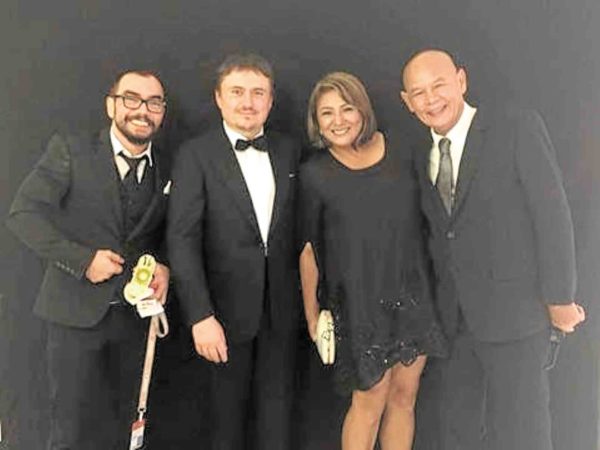
In Shanghai (from left): Director Paolo Villaluna, jury president Cristian Mungiu, and actors Cherry Pie Picache and Bembol Roco
Filipino filmmaker Paolo Villaluna proudly admitted that he almost fainted onstage when his latest movie, “Pauwi Na (Pedicab),” won the top prize at the 20th Shanghai International Film Festival.
Pardon Villaluna for being a bit flabbergasted. After all, Shanghai is an A-list festival (one of only three in Asia—along with Tokyo and Goa) and, as bonus, he got to receive the Golden Goblet trophy from jury president Cristian Mungiu.
Needless to say, the Filipino director admires the Romanian filmmaker who won the Palme d’Or for “4 Months, 3 Weeks, 2 Days” in 2007 and best director for “Bacalaureat” last year in Cannes.
Villaluna later scored a selfie with Mungiu after the awards ceremony held at the Shanghai Grand Theater in China last Sunday.
Mungiu earlier told the Hollywood Reporter: “I have tremendous respect for Asian films… [but] what’s more valuable than awards is that the film festival provides a fantastic opportunity for exchange and exploration concerning films and life in general.”
Previous Shanghai jury presidents were Luc Besson, John Woo, Danny Boyle and Barry Levinson.
It was quite a heady night for Villaluna, who attended the fest with “Pauwi Na” lead actors Bembol Roco and Cherry Pie Picache.
Roco said of the big win: “It feels great to bag the top award in an international film fest. It is significant because we have proven again that Filipino filmmakers are as competitive as their peers from around the world.”
Picache enthused: “We are ecstatic that our hard work and long wait have finally paid off. I feel happy and proud for our country. As Direk Pao would say: We need this good news—especially for Filipino filmmakers. Iba talaga ang Pinoy!”
She hailed the award as a “huge honor.” “I am reminded how much I love this job.” As icing on the cake, she got to meet and snap pics with such luminaries as Milla Jovovich and Isabelle Huppert.
Picache said she was particularly glad for her director who “worked so hard and passionately to put this film together.” She described the film as a “wonderful comeback” for Villaluna, who had been absent from the filmmaking scene for seven years.
At the awards ceremony, Villaluna, although flustered, readily shared the award with his countrymen. “[In my speech,] I dedicated the award to Filipinos,” he told the Inquirer. “The film has always been about the Filipino family and our national story of struggle and hope. It is thankless, painful and difficult, but we are resilient. I’m happy it resonated well with the audience and the jury.”
The film, which was inspired by an Inquirer article, tells the story of a poor family that travels from the city to a faraway province, in a pedicab. It won six trophies in the first ToFarm film fest last year.
Before leaving for China, Villaluna expressed concern that foreign audiences may not be able to relate well with the film which is inherently Filipino in its theme and storytelling.
Still, “Pauwi Na” was able to transcend cultural differences. On Facebook, Villaluna posted photos of a Chinese viewer who openly wept while chatting with Picache and Roco after a screening. “She said that we changed lives and told the truth well,” Villaluna recounted.
In awarding the Golden Goblet to Villaluna’s film, Mungiu commended “the humanism and universality of its story… the simplicity of the style and realization… the nonconformism with which it represented our desire to believe that there is a sense in this Universe.”
The Filipino film competed with 13 other entries, including movies from Iran (Mostafa Taghizad’h’s “Yellow,” which won the grand jury prize), Russia (Ivan Bolotnikov’s “Kharms,” best screenplay and cinematographer) and Poland (Maciej Pieprzyca’s “I Am a Killer,” best director).